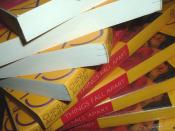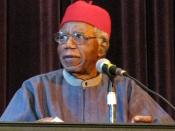What makes a tragedy so tragic is that the tragic hero, frequently because of his hamartia, falls a great distance from the high point where he is above many of us to the lowest point possible. In addition, they tend to be conductors of suffering as critic Northrop Frye says. These heroes catch the attention of the divine power and inevitably serve as instruments that bring suffering to both themselves and the people around them. The suffering that Okonkwo brings upon his clansmen in Chinua Achebe's novel Things Fall Apart contributes to the tragic vision of the work as a whole by emphasizing how much control man has over his own suffering, especially when he is an instrument that brings pain upon others as well.
Early on in the novel readers are introduced to Okonkwo's hamartia: the fear of appearing weak. This affects his temperament and the relationship he chooses to have with his family.
Okonkwo cannot show the affection he has to his family, even though he definitely has a strong fatherly affection to both his daughter Enzima, and the outsider Ikemefuna. Okonkwo's wives and his eldest son Nwoye suffer most from this lack of affection. The three wives bear many beatings; his second wife Ekwefi is almost killed with a gun when she mumbles an insulting remark about her husband's shooting skills. They go into exile for seven years with Okonkwo, and although the novel doesn't show what happens to the widows when Okonkwo commits suicide, it probably isn't a happy life. This lack of affection though is how Okonkwo stays strong and also how he achieved his high status in the community. After hearing what happened to Okonkwo's "lazy" father one can understand this sternness that Okonkwo lives with.
Nwoye also suffers more than his father's...


